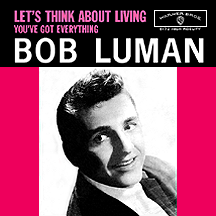BOB LUMAN
Let's Think About Living
His burning teenage desire was to be a rock and roller, so in the mid-'50s an eventual country music career might have been unthinkable to Bob Luman. For awhile it looked as though the base paths would be the road traveled; he was the star of his high school baseball team in the east Texas city of Kilgore. Keeping his options open, the singer-guitarist jumped at a chance to perform on Shreveport's Louisiana Hayride radio show (broadcast on more than two dozen stations in the south and midwest) in 1956, not long after Elvis Presley's run on the show had segued nicely into superstardom.
When an opportunity to play for the Pittsburgh Pirates didn't pan out, Luman was no longer torn between two loves. He decided to devote all of his efforts to music and formed a band called The Shadows (predating the British band of the same name by at least a year), which included guitarist James Burton, bassist James Kirkland and drummer Butch White. In 1957, still a teenager, Bob had three singles released on the Imperial label. The first, "Red Cadillac and Black Mustache," was a midtempo rock number backed with the the more pulse-pounding "All Night Long." The second single was "Red Hot," first waxed by Billy "The Kid" Emerson for Sun Records in 1955. Luman tackled the tune with conviction and his recklessly shrieking version may be the wildest of the many recorded through the years, including Billy Riley's rendition on Sun, released at about the same time as Bob's. None of the Imperial singles made much impact at the time, though, and the label dropped him.
Luman and the Shadows gained some exposure on the silver screen in 1957, performing "This is the Night" and "All Night Long" in one of producer-director Roger Corman's early low-budget films, Carnival Rock, which also featured The Platters and future country star David Houston, rockin' at the time for RCA Victor. By '58, Burton and Kirkland had bailed on Luman for more of a sure thing, backing Imperial star Ricky Nelson in the studio and in person, leaving Bob to his own devices. After two unsuccessful singles on Capitol, the company's A&R department wanted to take a new approach and change his name to Bobby Glynn, but Bob refused and they immediately cut him loose.

Warner Bros., fairly new in the record business at the time, had faith in the young singer, signing him to a longer-term contract in 1959 and producing his records in the teen style of Warner acts Tab Hunter, Roger Smith and others. "Class of '59" and "Dreamy Doll" fit this early WB model perfectly, yet still there was no airplay or sales action. Recording in Nashville in mid-1960 he found himself rubbing shoulders with the label's recently-acquired stars The Everly Brothers, who suggested a song their longtime good luck charm Boudleaux Bryant had written, "Let's Think About Living." More country than pop, it was a tongue-in-cheek protest of the "death song" craze ('In every other song that I've heard lately, some fellow gets shot...and his baby and his best friend both die with him, as likely as not...'), name-dropping Marty Robbins (whose hit "El Paso" gave an accounting of a cowboy's death), Patti Page (wearing black for no apparent reason) and Don and Phil Everly (feeling like they wanna die over that Cathy chick who made clowns out of them), overlooking more obvious choices like "Teen Angel" by Mark Dinning and Ray Peterson's "Tell Laura I Love Her." Arguably failing to make its point, the short song (under two minutes) hit big: top ten on both pop and country charts in the fall of 1960.
Luman was drafted by the U.S. Army at about this time, submitting to the rigors of basic training while the song rode high on the charts. Overcoming the innoportune timing, he continued making records in Nashville whenever he was given leave. The follow-up single, a remake of Don Gibson's "Oh Lonesome Me," fell short of the national charts, but its flip, "Why Why Bye Bye," made a brief chart appearance in England ("Let's Think" had gone top ten there as well) as did its spring '61 follow-up, John D. Loudermilk's "The Great Snow Man." Perhaps if he'd been free to tour the U.K., his career would have taken a different turn.
With no further hits, Warner Bros. opted out of the contract around the time of Luman's Army discharge in 1962. He began recording for Hickory Records the following year, focusing completely on country music. Avoiding permanent "one-hit" status, he scored several minor country hits, the biggest being "The File" in '64. After signing with Epic Records in 1968, things started rolling; there were more than two dozen country hits over the next decade. He reached the top ten twice in 1972 with "When You Say Love" (adapted from a popular beer commercial jingle, "When You Say Bud," and also a pop hit for Sonny and Cher later in the year) and "Lonely Women Make Good Lovers." 1973 was just as strong with two more country top tens, "Neither One of Us" (also a pop and R&B hit that year for Gladys Knight and the Pips) and "Still Loving You."
Bob Luman's career was cut short in 1978 when, at just 41 years of age, he died of pneumonia. Rockabilly fans consider his '50s recordings among the best of the genre. Country fans recall a different artist altogether, one with a memorable string of 1970s hits. In the realm of pop music, he's a "one-hit wonder" who sadly had a limited amount of time to try to follow the advice of his 1960 hit.


